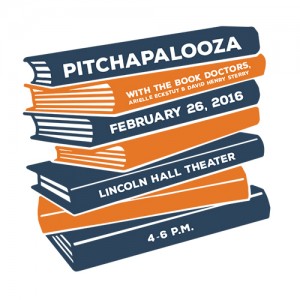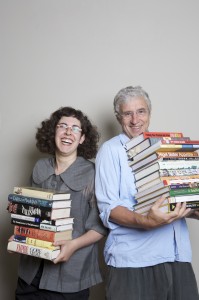At the end of February, prolific authors Arielle Eckstut and David Henry Sterry (The Book Doctors) visited the University of Illinois. The duo hosted a series of workshops—“Traditional, Independent, or Self-Publishing?”; “Making Editing Fun”; and “Perfecting Your Pitch”—followed by Pitchapalooza, an event they describe as the American Idol of  book pitches (minus Simon Cowell). Over the course of these four events, The Book Doctors imparted to attendees a wealth of valuable advice about writing and publishing any kind of book. Attending the events, I came away with both practical tips and a general sense of the complex processes by which a book idea evolves into a published text. Here are just a few of the takeaways from the events:
book pitches (minus Simon Cowell). Over the course of these four events, The Book Doctors imparted to attendees a wealth of valuable advice about writing and publishing any kind of book. Attending the events, I came away with both practical tips and a general sense of the complex processes by which a book idea evolves into a published text. Here are just a few of the takeaways from the events:
Getting a book published requires research and planning
The Book Doctors opened their first workshop with good news: anyone can get published! But they followed it immediately with bad news: anyone can get published. In such a competitive market, The Book Doctors stressed, having a great idea isn’t enough to turn
you into a published author. You also need strategy. If you’re thinking about publishing a book (or working for a publisher), you’ll want to familiarize yourself with the common practices of the industry in order to make an informed decision about which publishing path to pursue. For instance, if you’ve always dreamed of being represented by one of the US’s five major publishing houses (which require you to have an agent), you might research the benefits of instead working with an independent publisher (which can be both more accessible and more supportive) or look into self-publishing (which, for certain genres, no longer has the same stigma it had in the past). In order to successfully market your book idea, you’ll want to know which specific publishing houses would best suit your book, how your book would fit into a bookstore’s collection, what published works are comparable to your book project, and how to structure a pitch that engages the audience and conveys the work’s unique promises.
Technology can be a great tool for new authors
With more than 750,000 books published each year, you’ll need to use the resources at your disposal for publishing and promoting your book. Social media platforms like Twitter can enable you to network with readers and other writers, and you can use sites like GoodReads to build professional relationships digitally. The Book Doctors suggested that developing authors can also use a blog to establish a network of readers and to gain notice as an emerging writer which might lead to a book deal. If you decide to self-publish, a number of technological platforms and self-publishing services can help you maximize the success of your work, but you want to be sure to choose platforms and services that serve the interests of your work and do not take advantage of you.
What you learn in your English classes applies to the broader world of publishing
 The Book Doctors’ recommendations for good writing habits echoed what I’ve been told by many of my former English teachers and what I now tell my own English students:
The Book Doctors’ recommendations for good writing habits echoed what I’ve been told by many of my former English teachers and what I now tell my own English students:
- Revision should be viewed as an essential and ongoing process for all writing.
- Getting feedback from others will improve your writing (since, beyond a certain point, it is very difficult for any writer to evaluate her own work).
- Reading your work out loud as you edit will help you catch problematic sentences.
- “Showing” rather than “telling” makes writing more compelling.
- Whether you’re writing fiction or an academic essay, it’s important to compose a captivating opening that immediately draws your reader in.
- Anything that doesn’t add value to your text should be cut.
Our campus is full of creative, talented, interesting students
The best part of the event was hearing directly from the twenty students who gave book pitches at Pitchapalooza. The diverse pitches, whose genres and topics ranged from apocalyptic cli-fi to a picture book about an entomologist princess to a family memoir about surviving the Armenian genocide, highlighted the abundance of talent and the multiplicity of interests on campus. Such variety was illustrated in the pitches chosen as winner (a picture book about tricking the tooth fairy by Creative Writing major Sophie Rodgers) and runners-up (a YA thriller, a nonfictional account of the practice of Sharia law in Chicago, and an exploration of the rising cost of college tuition). Students from many disciplinary backgrounds—from Accounting to Creative Writing—came together to share their book ideas in a truly interdisciplinary forum. And the panel of judges—Eckstut, Sterry, Professor Gillen Wood of English, and Professor Walt Harrington of Journalism—offered insightful, individualized suggestions to strengthen each pitch, demonstrating the value of seeking another’s feedback. If you are interested in writing, seek out our campus’s flourishing community of student writers and use these relationships as resources to encourage mutual success!
If you missed the event, but want to learn from The Book Doctors, you can visit their website (http://www.thebookdoctors.com/), follow them on Facebook or Twitter (@TheBookDoctors), or check out their Essential Guide to Getting Your Book Published (available in The Career Center’s Resource Library).
